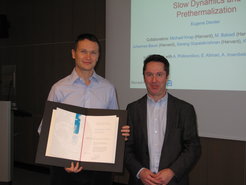Humboldt-Laureate Prof. Eugene Demler is being elected “Distinguished Scholar” at the Max Planck Institute of Quantum Optics
Theoretical physicist Professor Eugene Demler from Harvard University is visiting the Quantum Many-Body Systems Division of Prof. Immanuel Bloch
One of the leading experts in theoretical condensed matter physics, Professor Eugene Demler from Harvard University (Cambridge, USA), has joined the MPQ as a winner of a Humboldt Research Award. This Award is granted by the Alexander von Humboldt Foundation to out-standing foreign academics in order to promote cooperation with excellent German researchers. Prof. Demler was nominated by Prof. Immanuel Bloch (Chair of Experimental Physics at the Ludwig-Maximilians-Universität Munich and Director at the Max Planck Institute of Quantum Optics) and Prof. Wilhelm Zwerger (Chair of Theoretical Physics, Technische Universität München) who will host him during his stay in Germany.
Prof. Demler has now also been honoured as a “MPQ Distinguished Scholar”. This program has been launched by MPQ a couple of years ago in order to offer outstanding scientists from other research institutes worldwide new cooperation possibilities. Having started his visit on January 20th Demler will work in Munich until March 20th, and then again from May to July next year.

Prof. I. Cirac (right) hands the Certificate to Prof. Demler (left)
Professor Demler is well known internationally for his outstanding theoretical research in condensed matter and ultracold atom physics. Some of his research achievements concern the area of high-temperature superconductivity and the interdisciplinary field of ultracold atomic and molecular quantum gases. Other research highlights include work on quantum magnetism, non-equilibrium properties of quantum many-body systems and the realization and characterization of topological phases of matter. His pioneering work has laid the groundwork for experiments on quantum magnetism with ultracold quantum gases.
The broad range of topics covered in the work of Eugene Demler show his wide range of expertise. Many of his papers have been field openers and many others have led to high impact first experimental realizations of foundational many-body effects in joint theory experiment collaborations. “Many of his innovative theoretical ideas are of direct relevance to experiments and have opened new lines of research”, Prof. Bloch points out. “I am convinced that Eugene Demler’s visit to MPQ will trigger a lot of new ideas, and help us to discover new research opportunities”.
Information on the person:
Prof. Eugene Demler obtained his PhD degree from Stanford University in 1998. After a short postdoctoral stay at the University of Santa Barbara, he was recruited to Harvard University. In 2005 he was appointed to full professor at the age of only 33 years. He is a fellow of the American Physical Society, an associate member of the Canadian Institute of Advanced Research (CIFAR) and member of the Harvard-MIT Center for Ultracold Atoms (CUA) in Boston. He is a regular speaker at major international conferences and his work has been recognized through a Sloan fellowship, the Johannes-Gutenberg lecture award and an NSF (National Science Foundation) career award. Olivia Meyer-Streng
